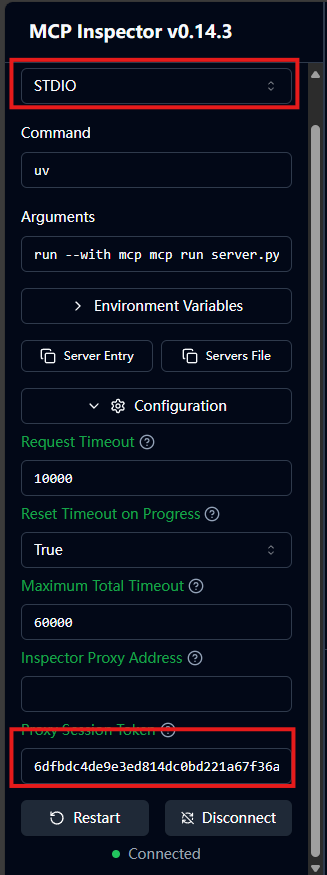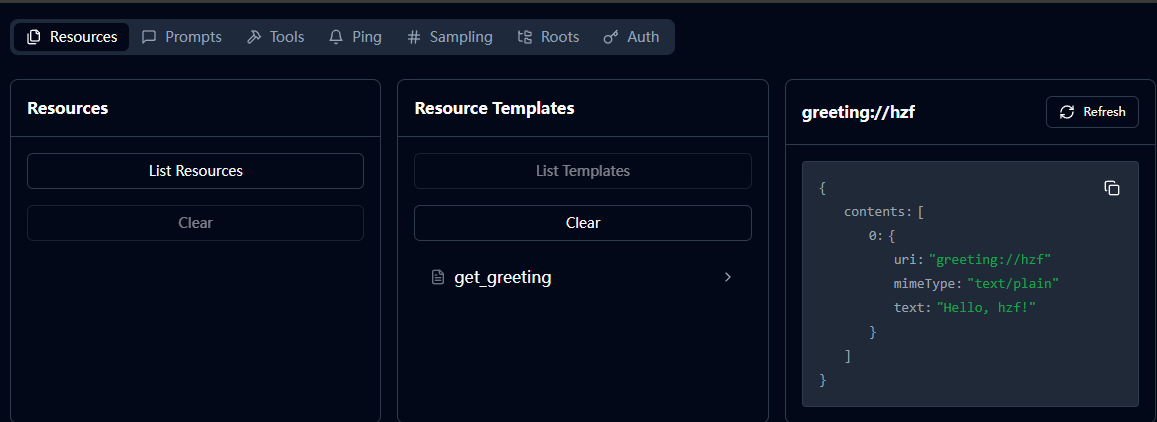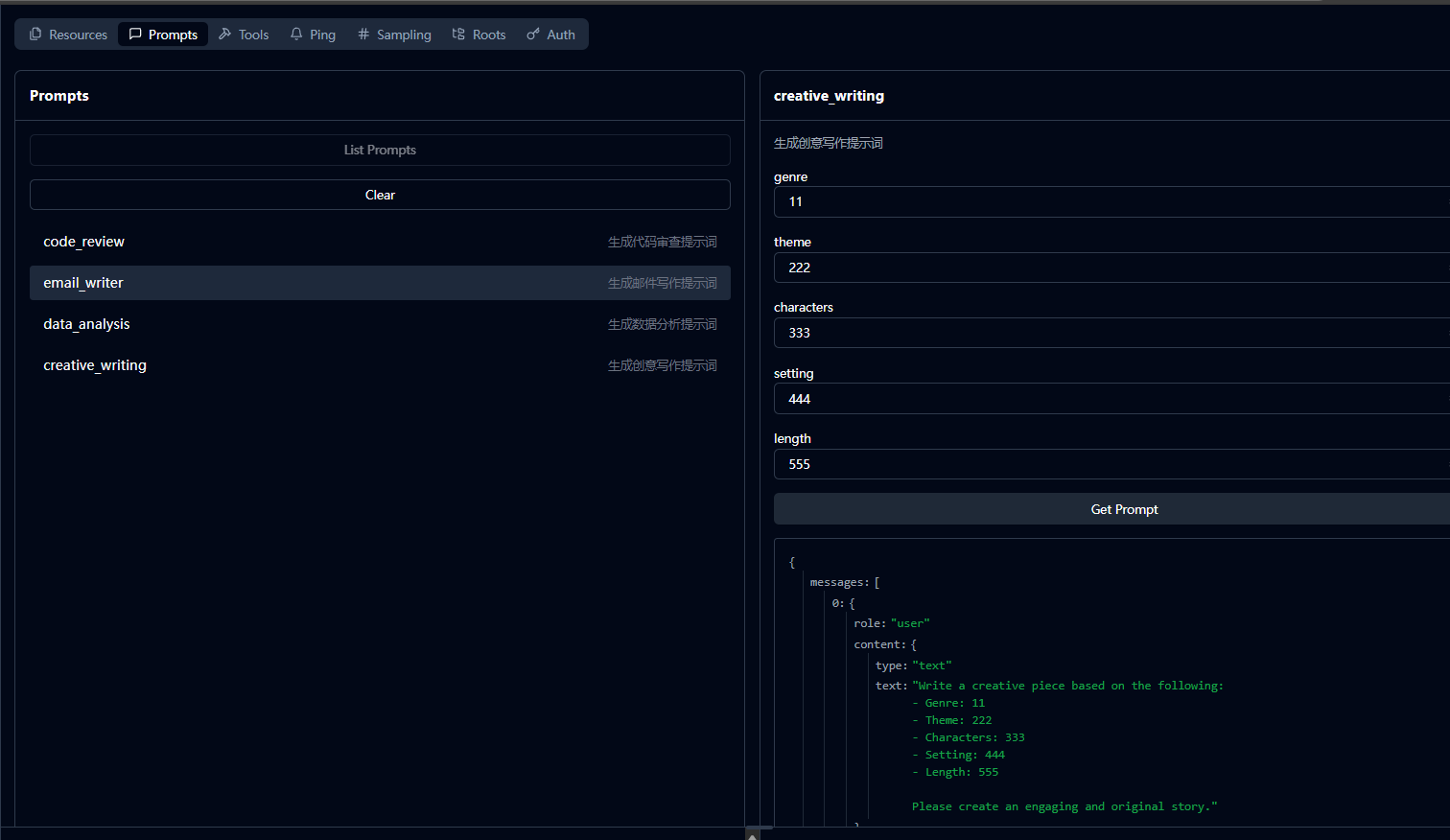
mcp for beginners:MCP服务端和客户端创建
# server.py
from mcp.server.fastmcp import FastMCP
# Create an MCP server
mcp = FastMCP("Demo")
# Add an addition tool
@mcp.tool()
def add(a: int, b: int) -> int:
"""Add two numbers"""
return a + b
# Add a dynamic greeting resource
@mcp.resource("greeting://{name}")
def get_greeting(name: str) -> str:
"""Get a personalized greeting"""
return f"Hello, {name}!"上面是stdio 通信方式
使用 mcp inspector 来查看 mcp的运行状态

输入上面token,选择stdio 通信,点击连接

右边点击list templates ,显示出所有的模板
资源
1. Resource Template
通过
@mcp.resource("greeting://{name}")装饰器定义包含动态路径参数
{name}(URL 中的占位符)作用:定义一类资源的生成规则
实际调用时需要传入具体参数(如
name="Alice")才能生成具体资源相当于一个工厂函数,根据输入参数动态生成资源
2. Resource
静态的、可直接访问的端点(如
@mcp.resource("status")定义/status)无动态路径参数
直接返回固定内容(或基于全局状态的动态内容)

修改代码添加 一个资源
@mcp.resource("docs://api-documentation")
def get_api_documentation() -> dict:
"""获取API文档"""
return {
"version": "1.0.0",
"title": "演示API",
"description": "这是一个MCP服务器的演示API",
"endpoints": [
{
"path": "/greeting/{name}",
"method": "GET",
"description": "获取个性化问候语"
},
{
"path": "/user/{id}",
"method": "GET",
"description": "获取用户信息"
}
],
"contact": {
"email": "[email protected]",
"website": "https://example.com"
}
}

添加prompts
Prompts是MCP服务器提供的提示词生成器,它们:
接收参数
返回格式化的提示词
帮助客户端生成高质量的AI提示词
# 添加代码审查提示词
@mcp.prompt("code_review")
def code_review_prompt(code: str) -> str:
"""生成代码审查提示词"""
return f"""Please review the following code and provide feedback on:
1. Code quality and best practices
2. Potential bugs or issues
3. Performance considerations
4. Security concerns
5. Suggestions for improvement
Code to review:
{code}
Please be constructive and specific in your feedback."""
# 添加邮件写作提示词
@mcp.prompt("email_writer")
def email_writer_prompt(subject: str, recipient: str, purpose: str, tone: str = "professional") -> str:
"""生成邮件写作提示词"""
return f"""Write a professional email with the following details:
- Subject: {subject}
- Recipient: {recipient}
- Purpose: {purpose}
- Tone: {tone}
Please make it clear, concise, and professional."""
# 添加数据分析提示词
@mcp.prompt("data_analysis")
def data_analysis_prompt(dataset_name: str, columns: str, analysis_task: str) -> str:
"""生成数据分析提示词"""
return f"""Analyze the following dataset and provide insights:
Dataset: {dataset_name}
Columns: {columns}
Task: {analysis_task}
Please provide:
1. Summary statistics
2. Key findings
3. Visualizations suggestions
4. Recommendations"""
# 添加创意写作提示词
@mcp.prompt("creative_writing")
def creative_writing_prompt(genre: str, theme: str, characters: str, setting: str, length: str) -> str:
"""生成创意写作提示词"""
return f"""Write a creative piece based on the following:
- Genre: {genre}
- Theme: {theme}
- Characters: {characters}
- Setting: {setting}
- Length: {length}
Please create an engaging and original story."""
Tool

使用客户端调用
from mcp import ClientSession, StdioServerParameters, types
from mcp.client.stdio import stdio_client
# Create server parameters for stdio connection
server_params = StdioServerParameters(
command="python", # Executable
args=["server.py"], # Optional command line arguments
env=None, # Optional environment variables
)
async def run():
async with stdio_client(server_params) as (read, write):
async with ClientSession(
read, write
) as session:
# Initialize the connection
await session.initialize()
# List available resources
print("=== LISTING RESOURCES ===")
resources = await session.list_resources()
for resource in resources:
print(f"Resource: {resource}")
# List available tools
print("\n=== LISTING TOOLS ===")
tools = await session.list_tools()
for tool in tools.tools:
print(f"Tool: {tool.name}")
# List available prompts
print("\n=== LISTING PROMPTS ===")
prompts = await session.list_prompts()
for prompt in prompts.prompts:
print(f"Prompt: {prompt.name}")
# Test greeting resource
print("\n=== TESTING GREETING RESOURCE ===")
try:
content, mime_type = await session.read_resource("greeting://Alice")
print(f"Greeting: {content}")
print(f"MIME Type: {mime_type}")
except Exception as e:
print(f"Error reading greeting resource: {e}")
# Test user resource
print("\n=== TESTING USER RESOURCE ===")
try:
content, mime_type = await session.read_resource("user://1")
print(f"User Info: {content}")
except Exception as e:
print(f"Error reading user resource: {e}")
# Test API documentation resource
print("\n=== TESTING API DOCUMENTATION RESOURCE ===")
try:
content, mime_type = await session.read_resource("docs://api-documentation")
print(f"API Documentation: {content}")
except Exception as e:
print(f"Error reading API documentation: {e}")
# Test add tool
print("\n=== TESTING ADD TOOL ===")
try:
result = await session.call_tool("add", arguments={"a": 10, "b": 20})
print(f"Add result: {result.content}")
except Exception as e:
print(f"Error calling add tool: {e}")
# Test code review prompt
print("\n=== TESTING CODE REVIEW PROMPT ===")
try:
prompt_result = await session.get_prompt("code_review", arguments={"code": "def hello():\n print('Hello, World!')"})
print(f"Prompt Result Object: {prompt_result}")
print(f"Prompt Result Type: {type(prompt_result)}")
print(f"Prompt Result Dir: {dir(prompt_result)}")
# Try to access the prompt content
print(f"Code Review Prompt (raw):\n{prompt_result}")
except Exception as e:
print(f"Error getting code review prompt: {e}")
# Test email writer prompt
print("\n=== TESTING EMAIL WRITER PROMPT ===")
try:
prompt_result = await session.get_prompt("email_writer", arguments={
"subject": "Meeting Request",
"recipient": "[email protected]",
"purpose": "Schedule a project review meeting",
"tone": "professional"
})
print(f"Email Writer Prompt Result: {prompt_result}")
# Try to access the prompt content
print(f"Email Writer Prompt (raw):\n{prompt_result}")
except Exception as e:
print(f"Error getting email writer prompt: {e}")
# Test data analysis prompt
print("\n=== TESTING DATA ANALYSIS PROMPT ===")
try:
prompt_result = await session.get_prompt("data_analysis", arguments={
"dataset_name": "sales_data_2024",
"columns": "date, revenue, region, product",
"analysis_task": "Identify top performing regions"
})
print(f"Data Analysis Prompt Result: {prompt_result}")
# Try to access the prompt content
print(f"Data Analysis Prompt (raw):\n{prompt_result}")
except Exception as e:
print(f"Error getting data analysis prompt: {e}")
# Test creative writing prompt
print("\n=== TESTING CREATIVE WRITING PROMPT ===")
try:
prompt_result = await session.get_prompt("creative_writing", arguments={
"genre": "science fiction",
"theme": "artificial intelligence",
"characters": "AI researcher, robot assistant",
"setting": "future laboratory",
"length": "short story"
})
print(f"Creative Writing Prompt Result: {prompt_result}")
# Try to access the prompt content
print(f"Creative Writing Prompt (raw):\n{prompt_result}")
except Exception as e:
print(f"Error getting creative writing prompt: {e}")
print("\n=== TESTING COMPLETED ===")
if __name__ == "__main__":
import asyncio
asyncio.run(run())
本文是原创文章,采用 CC BY-NC-ND 4.0 协议,完整转载请注明来自 blog.veyvin.com
评论
匿名评论
隐私政策
你无需删除空行,直接评论以获取最佳展示效果
.png)
